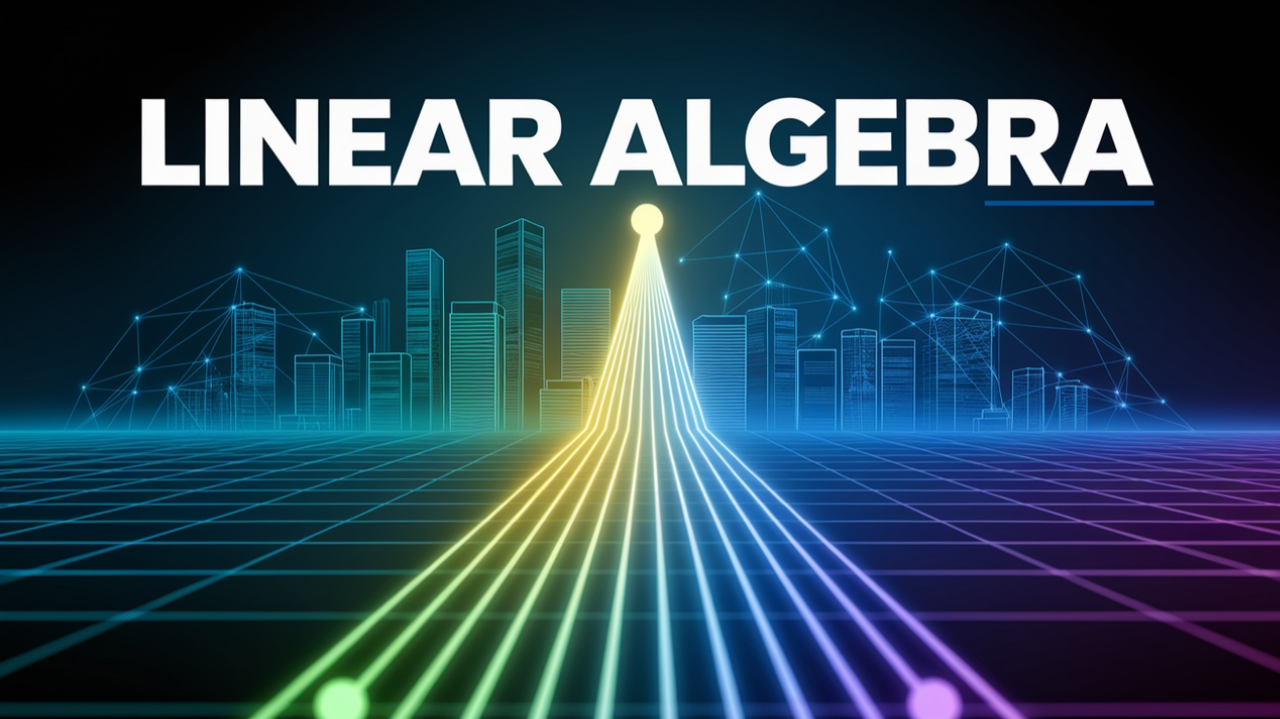
This course provides a thorough introduction to linear algebra concepts essential for understanding and implementing AI algorithms. The course is structured to build foundational knowledge and progressively delve into complex applications relevant to artificial intelligence.
Course Levels
-
Level 1: Foundations of Linear Algebra
In this foundational level, students will learn the basic concepts of linear algebra, including vectors and matrices, which serve as the building blocks for more advanced topics.
-
Level 2: Matrix Theory
This level explores more complex concepts related to matrices, including special types of matrices and their properties, which are crucial for understanding transformations used in AI.
-
Level 3: Vector Spaces
At this level, students will dive into vector spaces and subspaces, learning how these concepts apply to data representation and dimensionality in AI applications.
-
Level 4: Eigenvalues and Eigenvectors
This level covers eigenvalues and eigenvectors, which are essential for understanding data reduction techniques such as Principal Component Analysis (PCA) in AI.
-
Level 5: Advanced Topics in Linear Algebra
This advanced level explores concepts that are vital for machine learning algorithms, including advanced matrix factorization techniques and their applications.
-
Level 6: Practical Applications of Linear Algebra in AI
In this final level, students will apply their knowledge of linear algebra to real-world AI problems, including deep learning and natural language processing.
Course Topics
-
Linear Transformations
# Linear Transformations Linear transformations are fundamental concepts in linear algebra, especially useful in the field of AI for tasks such as image processing, data transformations, and more. Th...
-
Vector Spaces and Subspaces
# Vector Spaces and Subspaces ## Introduction to Vector Spaces A vector space is a collection of vectors, which are objects that can be added together and multiplied by scalars (numbers). Vectors can...
-
Introduction to Eigenvalues and Eigenvectors
# Introduction to Eigenvalues and Eigenvectors Eigenvalues and eigenvectors are fundamental concepts in linear algebra that play a crucial role in various fields, including artificial intelligence, m...
-
Determinants and Their Properties
# Determinants and Their Properties Determinants are scalar values that can be computed from the elements of a square matrix. They provide important insights into the properties of linear transformat...
-
Linear Algebra in Neural Networks
# Linear Algebra in Neural Networks Linear algebra is a foundational component of neural networks, providing the mathematical framework for data manipulation and transformations. In this section, we ...
-
Characteristic Polynomial
# Characteristic Polynomial The characteristic polynomial is a fundamental concept in linear algebra, particularly in the study of eigenvalues and eigenvectors. It provides a way to determine the eig...
-
Least Squares Problems
# Least Squares Problems Least squares problems are foundational in the field of linear algebra, particularly in data fitting and regression analysis. This topic explores how to minimize the sum of t...
-
Spectral Theorem
# Spectral Theorem The Spectral Theorem is a fundamental result in linear algebra that deals with the eigenvalues and eigenvectors of a matrix. It provides a powerful tool for understanding the prope...
-
Kernel Methods and Feature Spaces
# Kernel Methods and Feature Spaces In the realm of machine learning and statistics, kernel methods play a fundamental role in transforming data into a higher-dimensional space. This transformation m...
-
Matrix Inverses
# Matrix Inverses In linear algebra, the inverse of a matrix is a fundamental concept that plays a significant role in solving systems of equations, transformations, and various applications in AI. T...
-
Matrix Operations in Deep Learning
# Matrix Operations in Deep Learning Matrix operations form the backbone of many algorithms in deep learning. They allow us to efficiently perform computations on large datasets and are crucial in ar...
-
Singular Value Decomposition (SVD)
# Singular Value Decomposition (SVD) Singular Value Decomposition (SVD) is a powerful technique in linear algebra with numerous applications in data science, machine learning, and statistics. It allo...
-
Basis and Dimension
# Basis and Dimension In linear algebra, the concepts of basis and dimension are fundamental to understanding vector spaces. They provide a way to characterize the structure of vector spaces and how ...
-
Types of Matrices
# Types of Matrices Matrices are fundamental constructs in linear algebra and have various classifications based on their characteristics. Understanding the different types of matrices is crucial for...
-
Applications of Linear Algebra in Machine Learning
# Applications of Linear Algebra in Machine Learning Linear algebra is a foundational element in the field of machine learning. It provides the tools and language to manipulate data, build algorithms...
-
Diagonalization of Matrices
# Diagonalization of Matrices Diagonalization is a powerful technique in linear algebra that simplifies matrix computations, particularly when working with eigenvalues and eigenvectors. In this secti...
-
Introduction to Vectors
# Introduction to Vectors Vectors are fundamental objects in linear algebra that are used extensively in various fields, including physics, engineering, and artificial intelligence. In this section, ...
-
Matrix Factorization Techniques
# Matrix Factorization Techniques ## Introduction Matrix factorization is a powerful technique widely used in various domains, especially in machine learning and data mining. It involves decomposing ...
-
Basic Operations with Vectors
# Basic Operations with Vectors Vectors are fundamental objects in linear algebra, representing quantities that have both magnitude and direction. Understanding basic operations with vectors is cruci...
-
Linear Independence
# Linear Independence Linear independence is a fundamental concept in linear algebra that plays a crucial role in understanding vector spaces and their dimensions. In this section, we will explore wh...
- And 10 more topics...